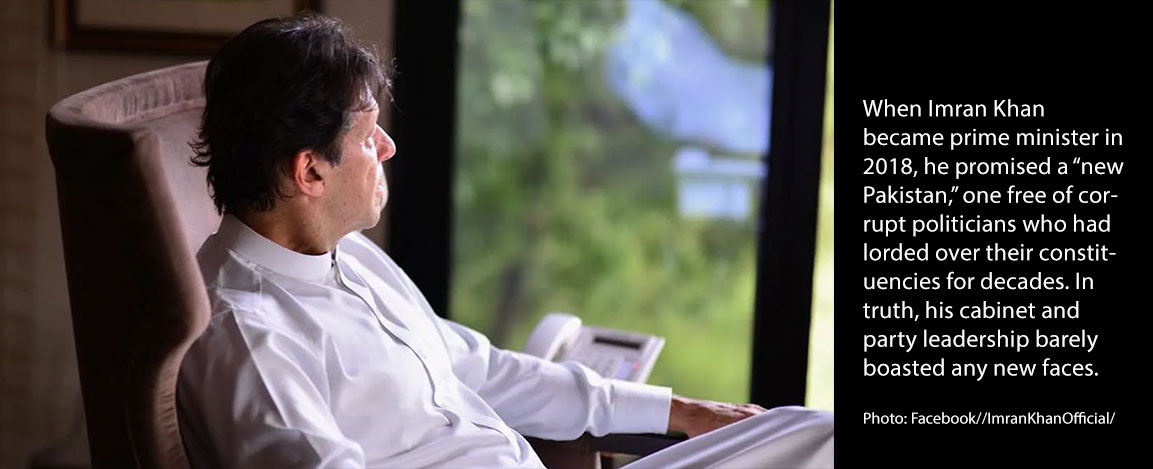Maham Javaid is the 2022 Elizabeth Neuffer Fellow at the International Women's Media Foundation and a research fellow at MIT's Center for International Studies. This article appeared here in the Boston Globe.
It took Imran Khan more than 20 years to become the prime minister of Pakistan. On Sunday, after a mere three and a half years in office, he became the first Pakistani prime minister to be voted out by a parliamentary no-confidence vote.
During his years in power, Khan, 69, told anyone who would listen that he understands the West. And yet he blamed the West, specifically the United States, for masterminding his ouster. But there was no US conspiracy against Khan. His ouster was a result of misguided reliance on the Pakistani military, and because of opposition parties that he had alienated to the point of no return. Still, in his final weeks of power, Khan repeated the foreign conspiracy so many times that he turned fiction into fact, at least for his followers.
A vote of no confidence against the prime minister is a dull business. Members of Parliament stand up and walk out of one of two doors to signify a yes or a no in response to the vote. The entire process takes less than 15 minutes.
In Khan's case, the process took almost a week, and every moment was a nail-biter. If Parliament didn't want him as prime minister, then there shouldn't be a Parliament at all, he seemed to say.
The first attempt at the vote was called off by the deputy speaker of the Parliament, citing that the vote was unconstitutional. The move was so unexpected that before anyone could grasp what had happened, Khan appeared on television, and after congratulating the nation for warding off the American conspiracy against Pakistan, he asked the president to dissolve the Parliament and called for fresh elections.
And just like that, until the country's Supreme Court reinstated the Parliament and mandated the vote, the country lived without a parliament for a few days.
It was during these days that Khan's ramblings about a US conspiracy against him and Pakistan took hold. As “evidence,” Khan presented a diplomatic cable he received from the Pakistani ambassador to the United States about a meeting with US Assistant Secretary of State for South and Central Asia Affairs Donald Lu. Reportedly, the United States was “annoyed with Mr. Khan over his 'independent foreign policy' and visit to Moscow.”
Even as his feeble “proof” was denied by the United States, his rhetoric grasped the hearts and minds of his supporters. Each television performance was more emotive than the last. He offered the country a false choice: Follow him or become “American slaves.”
Eventually, after a 13-hour Parliament session rife with rumors of a military coup that never materialized, he was removed. His dramatic fall from power gave his “foreign conspiracy of regime change” the fuel it needed. Tens of thousands of supporters in Pakistan, as well as diasporas across the world, are congregating and demanding his reinstatement.
Such is the former cricket legend's appeal that American Pakistanis are burning their Pakistani passports to register their agitation. In an equally unreasonable fashion, British Pakistanis are threatening to stop sending monetary remittances to their families in Pakistan. If history is any measure, the protests will grow — Khan appears to be his best political self and completely in his element when he is on the streets demanding power; it is only when he is in power in the Parliament that he seems out of place.
When Khan became prime minister in 2018, he promised a “new Pakistan,” one free of corrupt politicians who had lorded over their constituencies for decades. In truth, his cabinet and party leadership barely boasted any new faces.
In fact, Khan's rule was characterized by clampdowns on the press and civil liberties. He and his government repeatedly victim-blamed women for sexual violence committed by men; they stood by as dissenters were disappeared by the state: they participated in the marginalization of religious and ethnic minorities and did not lift a finger when transgender people were being brutalized by society at large. They turned a blind eye to online political vitriol. Now, only days after losing power, they are decrying human rights abuses in Pakistan, a complaint rarely heard from them before.
Even though Khan's imagined US conspiracy theory has been debunked, Khan and his party members are refusing to admit that his self-victimization was based on a generic diplomatic cable, not a legitimate threat. To admit his mistake, Khan would have to point fingers at the military, which may serve him in the moment but would jeopardize his return to power. Khan could not have risen to power without the implicit support of the Pakistani military.
All this leaves the new government, which is actually as old as the hills — the incoming prime minister, Shahbaz Sharif, is the younger brother of three-time former prime minister Nawaz Sharif, and their party has ruled the country many times — with a divided nation where both sides are calling each other traitors. The Sharifs are accompanied at the helm by the Bhuttos, who have also ruled and failed Pakistan several times.
Together, they have to deal with their own power-hungry politicians, a scorned former leader who is convinced he must save the country from a foreign conspiracy, an unenvious economy, and very messy foreign relations with the United States, Pakistan's largest export market.
Maham Javaid is the 2022 Elizabeth Neuffer Fellow at the International Women's Media Foundation and a research fellow at MIT's Center for International Studies.




